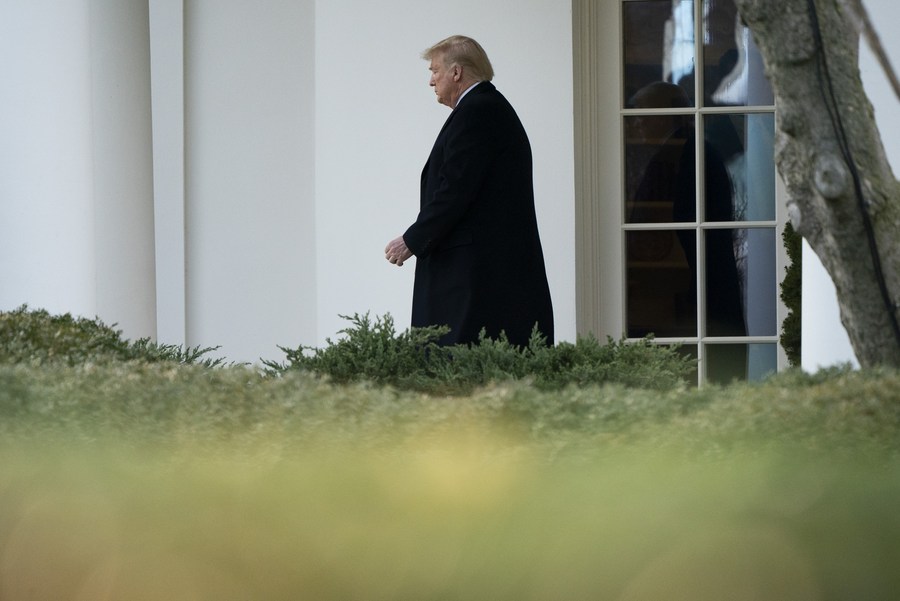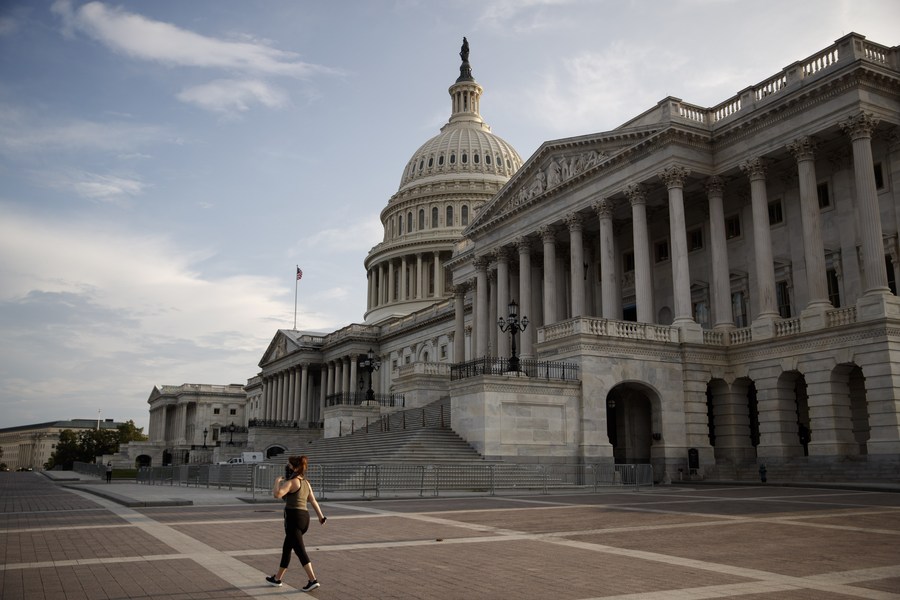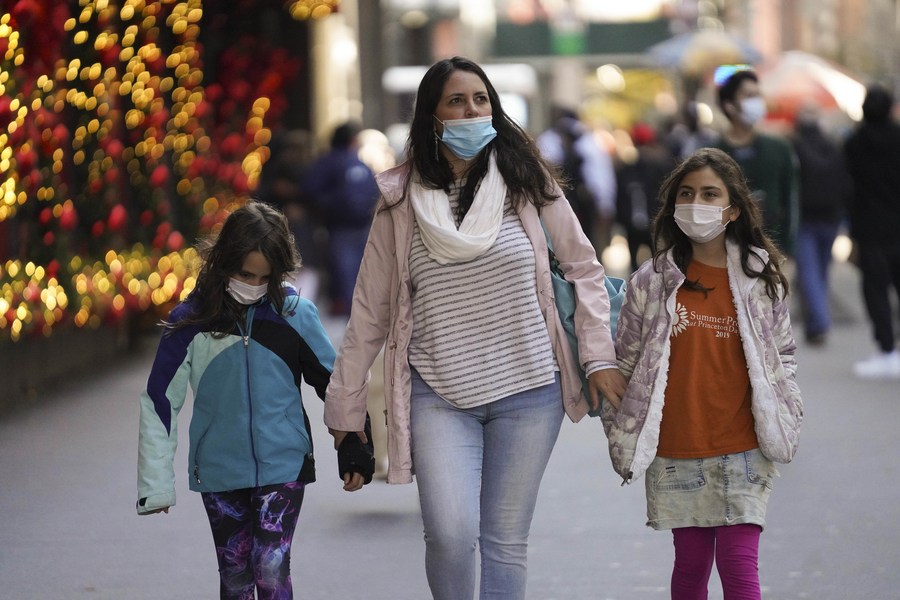


U.S. President Donald Trump leaves the White House in Washington D.C., the United States, on Feb. 28, 2020. (Photo by Ting Shen/Xinhua)
Academics and policymakers are far too relaxed about the ballooning of the U.S. budget deficit and the skyrocketing of the public debt. While this might not be an immediate problem in a world of high unemployment and very low inflation, it will be a problem for monetary policy once the economy has recovered, an economist said.
by Matthew Rusling
WASHINGTON, Dec. 25 (Xinhua) -- The 900-billion-U.S.-dollar relief plan is up in the air over Christmas after House Republicans have rejected President Donald Trump's demand to raise direct payments to Americans.
Republicans in the U.S. House of Representatives on Thursday blocked an attempt from House Democrats to raise the bill's 600-dollar direct payment checks to 2,000 dollars, a figure demanded by Trump.
The House and Senate both approved the package late Monday, along with 1.4 trillion dollars in government funding for the rest of the fiscal year, which ends on Sept. 30, 2021, sending the giant spending bill to the president to sign into law.
"The bipartisan COVID relief & omnibus bill has been enrolled," House Speaker Nancy Pelosi, top Democrat in the lower chamber, wrote in a Twitter post on Thursday. "The House & Senate are now sending this important legislation #ForThePeople to the White House for the President's signature. We urge him to sign this bill into law to give immediate relief to hard-working families!"
RARE ALIGNMENT
On Tuesday, Trump said in a video that he wanted Congress to increase the amount in the stimulus checks, calling the 600 dollars for individuals "ridiculously low."

U.S. House Speaker Nancy Pelosi speaks during a press conference on Capitol Hill in Washington, D.C., the United States, Dec. 4, 2020. (Photo by Ting Shen/Xinhua)
Pelosi then retweeted the video and said Republicans repeatedly refused to say what amount the president wanted for direct checks.
"At last, the President has agreed to 2,000 dollars -- Democrats are ready to bring this to the floor this week by unanimous consent. Let's do it!" said Pelosi.
It was a rarity that Democrats and the White House, who have been caught in bitter partisanship in the last four years, joined in calling for a larger stimulus package, experts said.
The 900-billion-dollar package would be the second-largest relief deal after the 2-trillion-dollar CARES Act that Congress approved in March.
The relief measure came after Democratic and Republican lawmakers finally reached a deal on Sunday, following months of deadlock over the size and scope of the package.
For Democrats, the package is much smaller than the 3.4-trillion-dollar proposal they passed in the House in May, and down from the 2.2-trillion-dollar trimmed version they offered in October.
Some Senate Republicans, however, insisted on a relief package below 1 trillion dollars, and had previously pushed for a 500-billion-dollar bill.

Photo taken on Sept. 2, 2020 shows the U.S. Capitol Building in Washington, D.C., the United States. (Photo by Ting Shen/Xinhua)
Democrats would by and large gladly increase the size of the direct payments while many Republicans in Congress think 600 dollars is too high, Christopher Galdieri, assistant professor at Saint Anselm College, told Xinhua.
"This also gives the Democrats in Georgia's two U.S. Senate races a chance to attack their opponents over this issue," Galdieri added.
Democrats flipped one net seat in general elections and currently control 48 seats in the Senate, while Republicans have won 50 seats. Two seats are still up for grabs in Georgia as the state's Senate elections head to runoffs in January.
IN LIMBO
Trump left for Mar-a-Lago, his club in Palm Beach, Florida, on Wednesday without saying another public word on the relief bill's fate.
One possibility is that Trump could play the issue out until Dec. 29 deadline, and then sign the bill as is, to avoid a government shutdown, said Clay Ramsay, a researcher at the center for international and security studies at the University of Maryland, in an interview with Xinhua.
But if the president does nothing, the legislation and its relief will die on Jan. 3 with the statutory end of the current Congress.
That means millions of Americans are in danger of losing important benefits just after the holidays.

People wearing face masks are seen in New York, the United States, Nov. 27, 2020. (Xinhua/Wang Ying)
Trump is "probably right that the 600 dollar payment is ridiculously low for people in real need and that the U.S. economy might very well need a bigger stimulus package than Congress has passed," Desmond Lachman, a resident fellow at the American Enterprise Institute, told Xinhua.
However, what the president is not telling people is that the 2,000-dollar payment that he is proposing would be "as badly targeted as the current 600 dollar payment."
"It would be going not only to people in real need and to people who have lost their jobs but also to people earning six-figure incomes and to people who did not lose their jobs," Lachman said.
"The package should have included a larger figure than the 600 dollars but it should have been limited to people in real need," Lachman said.
Lachman said academics and policymakers are far too relaxed about the ballooning of the U.S. budget deficit and the skyrocketing of the U.S. public debt.
While this might not be an immediate problem in a world of high unemployment and very low inflation, it will be a problem for monetary policy once the economy has recovered, Lachman said.
With so much government debt, the Federal Reserve will be under huge pressure not to raise interest rates as the economy recovers even though this might mean higher inflation, Lachman said.

 Award-winning photos show poverty reduction achievements in NE China's Jilin province
Award-winning photos show poverty reduction achievements in NE China's Jilin province People dance to greet advent of New Year in Ameiqituo Town, Guizhou
People dance to greet advent of New Year in Ameiqituo Town, Guizhou Fire brigade in Shanghai holds group wedding
Fire brigade in Shanghai holds group wedding Tourists enjoy ice sculptures in Datan Town, north China
Tourists enjoy ice sculptures in Datan Town, north China Sunset scenery of Dayan Pagoda in Xi'an
Sunset scenery of Dayan Pagoda in Xi'an Tourists have fun at scenic spot in Nanlong Town, NW China
Tourists have fun at scenic spot in Nanlong Town, NW China Harbin attracts tourists by making best use of ice in winter
Harbin attracts tourists by making best use of ice in winter In pics: FIS Alpine Ski Women's World Cup Slalom
In pics: FIS Alpine Ski Women's World Cup Slalom Black-necked cranes rest at reservoir in Lhunzhub County, Lhasa
Black-necked cranes rest at reservoir in Lhunzhub County, Lhasa China's FAST telescope will be available to foreign scientists in April
China's FAST telescope will be available to foreign scientists in April